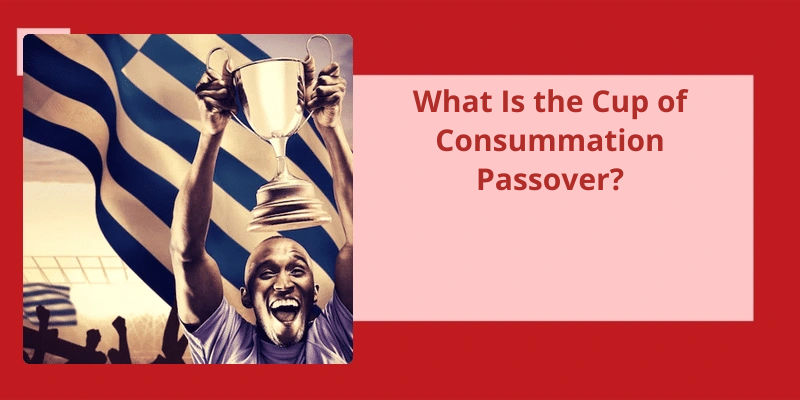The Cup of Consummation Passover is a significant part of the Passover ceremonies that holds immense spiritual and historical importance in the Jewish tradition. It represents the final stage of the Passover meal, marking the conclusion of the celebrations. The fourth cup of the Passover symbolizes the ultimate union between God and his people, where God pledges to take the Jewish people as his own. Along with this, the recitation of the Hallel Psalms, which are Psalms of praise and thanksgiving, further emphasizes the joy and gratitude for the blessings of God. This final cup of Passover reminds us of the rich cultural and religious heritage of the Jewish people and the significance of their customs and traditions.
What Is the Cup of Blessing for Passover?
And finally, the fourth cup is the Cup of Praise (“I’ll take you as My people”). Each cup has a specific blessing and significance that’s associated with the Passover meal. This tradition has been practised for centuries and is deeply rooted in Jewish culture and history.
The Cup of Sanctification represents the beginning of the Israelites” journey out of Egypt and their redemption from slavery. It’s a symbol of God’s promise to bring His people out of bondage and into freedom. The Cup of Sanctification is typically filled with either red wine or grape juice and is the first cup consumed during the Passover Seder.
The Cup of Deliverance symbolizes the fulfillment of God’s promise to free His people from slavery. It represents the physical and spiritual liberation that the Israelites experienced when they were delivered from Egyptian bondage.
The Cup of Redemption represents the sacrificial lamb that was offered in the Temple during Passover. It signifies God’s act of redeeming His people from sin and death, and it serves as a reminder of the ultimate sacrifice that Jesus made on the cross for the redemption of mankind.
The Cup of Praise is the final cup consumed during the Passover Seder. This cup is typically filled with sweet white wine and is meant to be savored and enjoyed as a celebration of God’s goodness and faithfulness.
The Passover tradition of drinking the four cups of wine or grape juice is a powerful reminder of God’s faithfulness to His people. Each cup signifies a critical moment in the Israelites” journey out of Egypt and their ultimate redemption through Jesus Christ. As we participate in this time-honoured tradition, we’re invited to remember the incredible love and sacrifice that God has shown us and to celebrate His goodness and faithfulness.
The Passover offering holds great significance in Jewish tradition, symbolizing freedom and redemption. Along with commemorating the Exodus from Egypt, it also brings blessings to those who partake in it. These blessings, consisting of both material and spiritual benefits, are believed to be bestowed upon those who observe Passover and follow the commandments of God. Let’s delve deeper into the seven blessings of the Passover offering and understand their significance. But before that, let’s acknowledge the power of time that’s in the hands of the Almighty.
What Are the 7 Blessings of the Passover Offering?
The Passover offering is a ritual that’s been observed by the Jewish people for centuries. It’s a mark of their liberation from bondage in Egypt as well as a celebration of Gods power and mercy. The seven blessings associated with the Passover offering are promises that God made to his people in the Old Testament. These blessings are believed to be reserved for those who honor God by performing the Passover offering ritual.
The second blessing is that God will be an enemy to the enemies of the individual who performs the ritual. This is a promise of protection from harm and a warning to those who’d wish to do harm to Gods people.
The third blessing is that God will give prosperity to the person who performs the Passover offering ritual. This is a promise of material abundance and financial success.
The fourth blessing is that God will take sickness away from the person who performs the ritual. This is a promise of good health and longevity.
The fifth blessing is that God will give a long life to the individual who performs the Passover offering ritual. This is a promise of a long and fulfilling life.
The sixth blessing is that God will cause increase in the life of the person who performs the ritual. This is a promise of growth, progress, and success in all areas of life.
Finally, the seventh blessing is that God will give a special years blessings to the person who performs the ritual. This is a promise of divine favor, success, and abundance for the entire year.
The Passover festival holds great significance in the Jewish tradition as it commemorates the liberation of the Israelites from slavery in Egypt, as recounted in the Old Testament. The festival is celebrated with great enthusiasm and is replete with interesting customs and rituals that have been passed down through generations.
What Did the Passover Symbolize?
Passover symbolizes the liberation of the Israelites from slavery. According to the Bible, the Israelites were enslaved in Egypt for 400 years before God intervened to set them free. The Passover festival is a reminder of this miraculous event. During Passover, Jewish families gather together to retell the story of the Exodus, and to celebrate their freedom.
At the heart of the Passover celebration is the Seder meal. The Seder is a festive meal that features a variety of traditional foods, including matzah (unleavened bread) and bitter herbs. These foods symbolize the hardships the Israelites endured during their time in Egypt. The Seder also includes four cups of wine, which symbolize the four stages of the liberation process: redemption, release, transformation, and elevation.
For example, many families will clean their homes thoroughly before the festival begins, in order to rid them of any traces of leavened bread. This is because the Israelites didn’t have time to wait for their bread to rise before fleeing Egypt, and so they ate only unleavened bread during their journey to freedom.
Another important Passover tradition is the recitation of the Haggadah, a text that tells the story of the Exodus and provides a framework for the Seder meal. The Haggadah also includes songs, prayers, and other readings that reflect on the themes of liberation and redemption. Passover is a time for Jews to reflect on the importance of freedom, and to celebrate the many blessings that have been bestowed upon them.
It’s a reminder of the importance of freedom and liberation, and a celebration of the many miracles and blessings that God has bestowed upon the Jewish people throughout history. By celebrating Passover, Jews reaffirm their commitment to their faith and to the values of justice and compassion that lie at it’s heart.
The Significance of the Number Four in the Passover Ceremony
- The Passover ceremony is celebrated for four consecutive nights
- There are four cups of wine that are drunk during the Seder
- There are four questions asked during the Seder
- There are four children mentioned in the Haggadah – the wise, the wicked, the simple, and the one who doesn’t know how to ask
- There are four main themes of Passover – freedom, faith, family, and future
- There are four stages of redemption that are mentioned in the Haggadah – “I’ll take you out”, “I’ll save you”, “I’ll redeem you”, and “I’ll take you as my people”
- There are four items on the Seder plate – the shank bone, the egg, the bitter herbs, and the charoset
Passover is a significant holiday celebrated by Jews that commemorates their liberation from slavery in Egypt. During this time, traditional blessings are recited, with the aim of spreading love, goodwill, and justice among all people. However, Passover blessings go beyond this aim, towards the ultimate vision of a world free from tyranny and slavery, where peace and freedom shall eternally reign. In this article, we uncover the various blessings of the Passover holiday.
What Are the Passover Blessings?
Passover is a significant event in Judaism, as it commemorates the liberation of the Israelites from slavery in Egypt. It’s celebrated with prayers, feasting, and rituals, most notably the Seder, a ritual meal that involves the retelling of the Passover story and the consumption of symbolic foods. Yet, beyond the rituals and customs, Passover is also a time of blessings.
One of the central Passover blessings is the desire to cleanse every heart of hatred and strife. As the Israelites were freed from physical slavery, so too should humanity be liberated from the bonds of animosity and conflict. Passover is a time to reflect on the negative emotions that hold us back and strive to eliminate them from our hearts and minds.
Passover blessings also encompass the idea of renewal and growth. The holiday falls in the spring, a time when new life emerges after a long winter. It’s a time to embrace change and look ahead with hope and optimism.
Passover blessings also focus on gratitude and thanksgiving. The Seder is filled with prayers of thanks for the miracles performed to liberate the Israelites, and for the bounty of the earth that sustains us all. This gratitude extends to all forms of blessings, big and small, reminding us to appreciate the good things in life and to celebrate them with joy and gladness.
Source: Prayers in Honor of Passover – 18Doors
Passover is a celebration steeped in tradition and symbolism. One such tradition is the drinking of four cups of wine during the Seder, each with a specific meaning. While many may wonder why four cups are necessary, the answer lies within the deep-rooted history of the Jewish people. From the Egyptian exile all the way to their current situation, the four cups serve as a reminder of their journey and hope for a brighter future. Interestingly enough, the significance of four cups can also be traced back to a passage in the book of Genesis.
Why Do They Have 4 Cups of Wine at Passover?
The Passover Seder is a feast that’s celebrated every year by Jews all over the world. One of the main symbols of the Seder is the four cups of wine that are drunk during the meal. The four cups are meant to represent different aspects of the redemption story that’s told during the Seder.
The first cup represents Kiddush, or sanctification. This is when we thank God for the gift of freedom and remember the Exodus from Egypt. The second cup represents the plagues that were brought upon the Egyptians in order to force them to release the Jews from slavery. The third cup represents the redemption itself, which was achieved when God led the Jews out of Egypt and towards the Promised Land. Finally, the fourth cup represents the future redemption that we hope will come with the coming of Moshiach.
The four cups of wine also have a deeper meaning. In the Talmud, the number four is often associated with the concept of completion or wholeness. The four cups of wine, therefore, represent a complete expression of gratitude and joy for the redemption.
The tradition of drinking four cups of wine during the Seder dates back to early rabbinic times, and it’s been practiced by Jews for centuries. It’s interesting to note that the phrase “cup of wine” is mentioned four times in Pharaohs butlers dream in the book of Genesis. Some scholars believe that this may have been an early reference to the four cups of wine that are drunk during the Passover Seder.
As we celebrate the Passover Seder each year, we remember our journey from slavery to freedom, and we look forward to the coming of Moshiach and the ultimate redemption.
The Significance of Each of the Foods on the Seder Plate
The Seder plate is a symbolic part of the Passover meal and includes six different foods that represent different parts of the holiday’s story. These foods include a lamb shank bone, an egg, bitter herbs, charoset (a sweet mixture of fruits and nuts), karpas (a vegetable), and maror (a type of lettuce). Each of these foods has a significant meaning and plays an important role in the Passover Seder.
Conclusion
In conclusion, the Passover is a significant event in the Jewish faith that’s commemorated annually through various ceremonies. One of the pivotal components of this celebration is the fourth cup or the Cup of Consummation/Praise. This cup symbolizes the promise of God to take his people and be their God, reflecting the relationship between the Creator and his children. The Passover ceremonies culminate with the recitation of the Hallel Psalms, which are songs of praise that express gratitude and adoration for the Lord's blessings. Throughout history, the Passover and it’s various elements have provided a powerful source of inspiration and hope for millions of people worldwide, serving as a reminder of the enduring bond between the divine and the human.






